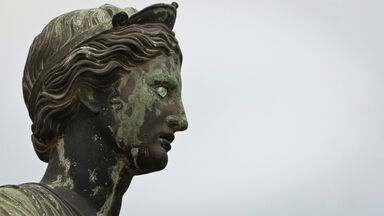Under her native name, Britomartis (= the sweet maiden) or Dictynna, she approaches Artemis and Leto, again associated with an infant god, and this Cretan virgin goddess was worshipped in Aegina under the name of Aphaea.
Proud of her numerous family, six daughters and six sons, she boasted of her superiority to her friend Leto, the mother of only two children, Apollo and Artemis.
Enmann, who interprets the name as "she who prevents increase" (in contrast to Leto, who made women prolific), considers the main point of the myth to be Niobe's loss of her children.
Leto, pregnant by Zeus, seeks for a place of refuge to be delivered.
In the oldest forms of the legend Hera is not mentioned; but afterwards the wanderings of Leto are ascribed to the jealousy of that goddess, enraged at her amour with Zeus.

